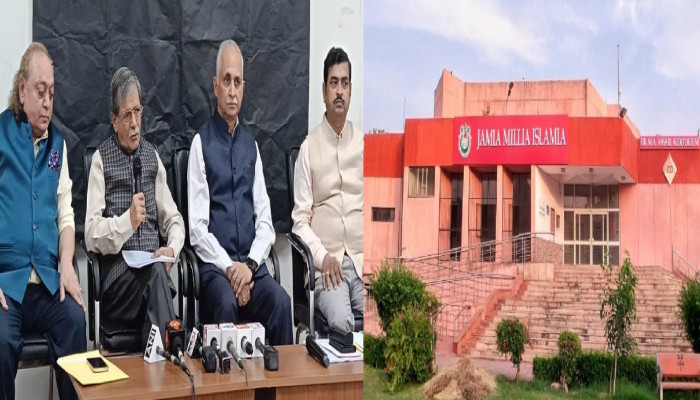The latest revelations from a fact-finding report on Jamia Millia Islamia University are deeply disturbing. Allegations of non-Muslim students being coerced into converting to Islam under threats of rape and violence have shocked the conscience of the nation. If this report holds true, it signals a troubling pattern of forced conversions that could be happening across the country, largely unnoticed or ignored. Such incidents are not just isolated acts of criminality but a direct assault on the Constitution of India and its secular fabric. The report, prepared by the NGO “Call for Justice” and led by respected legal experts, highlights a pattern of discrimination against non-Muslims within the institution. Testimonies detail threats, harassment, and mistreatment of students and staff based on their religious identity. In one shocking instance, non-Muslim students were reportedly threatened at knifepoint to embrace Islam or face sexual assault. Many of these students, particularly from weaker sections like Dalits and tribal communities, were allegedly forced to abandon their education out of fear. This is an intolerable situation that demands urgent action.
Article 25 of the Indian Constitution guarantees every citizen the right to practice, profess, and propagate their religion freely. However, this freedom does not extend to forced conversions. The Supreme Court has repeatedly emphasized that conversions must be genuine, voluntary, and free from coercion or misrepresentation. In C.T. Selvaraj v. State of Tamil Nadu, the Court ruled that any conversion achieved through force or deceit violates the fundamental right to freedom of religion. These protections exist not only to safeguard individual liberty but also to maintain the secular character of our nation. Yet, despite these legal safeguards, instances like the one reported at Jamia Milia Islamia highlight a grim reality. Certain institutions, shielded by the banner of minority rights, appear to be turning a blind eye to coercive practices. The government must act swiftly and decisively against such violations. Allowing religious intolerance and forced conversions to go unchecked will only deepen societal divisions and threaten the secular foundation of our democracy.

The report also underscores a toxic environment within the university, where non-Muslim faculty and staff face harassment and discrimination. Testimonies reveal how a non-Muslim Assistant Professor was subjected to repeated insults by colleagues, while a Scheduled Caste faculty member was denied even basic facilities like office furniture, privileges freely granted to their Muslim counterparts. In another instance, a senior administrative officer faced public ridicule for holding a prominent position as a non-Muslim. Such blatant discrimination not only violates individual rights but also undermines the integrity of our educational institutions. The question now is, what can the government do to address this alarming trend? Mere lip service to secularism will not suffice. Strong legal action against those found guilty is the first step. But beyond that, it’s time to reconsider the special privileges granted to minority institutions. If religious institutions are being used to facilitate forced conversions, then stricter regulations are needed. One potential solution is to mandate that these institutions only admit students from their own religious communities if they are unwilling to respect the rights of others. While India is a secular nation, its secularism must not be mistaken for weakness. It is built on the principle that all citizens, irrespective of their religion, should have equal rights and protections. The government must not shy away from enforcing these principles, even if it means confronting politically sensitive groups. Without decisive action, we risk eroding the very values that make India a diverse yet united nation.






